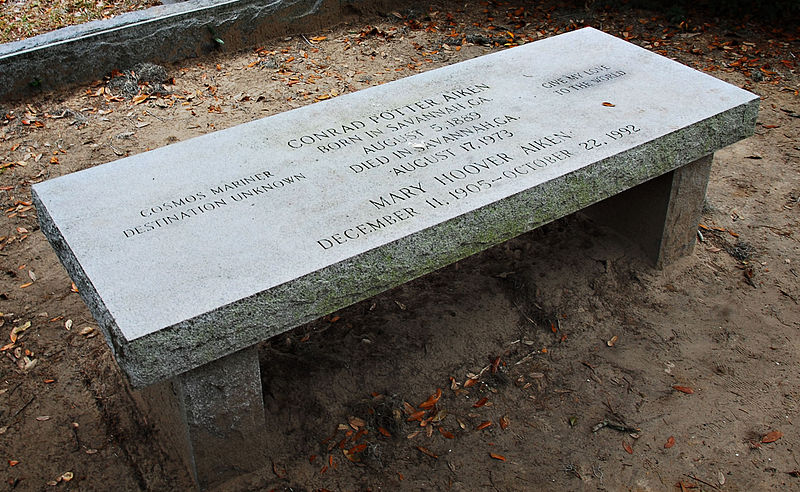Born in that most magical city, Savannah, I was allowed to run wild in that earthly paradise until I was nine: ideal for the boy who early decided he wanted to write.

Conrad Potter Aiken was born in Savannah in 1889 and lived in an elegant townhouse on Oglethorpe Avenue across the street from Colonial Cemetery. He often played in that ancient burial ground midst tabby crypts and tombstones where the mortal remains of many of Georgia's aristocracy found rest. From the time he was eight or nine he wanted to be a poet. Soon he found himself captured by the works of Edgar Allan Poe and happily sharing the terror with his brother and sisters.
With his parents immersed in Savannah society and surrounded by wealth, privilege, and pedigree, he seemed destined for happiness. After all, his father was a successful New England physician and both parents had a long heritage steeped in Unitarianism and transcendental thought. But all was not well. One day, when he was eleven, he returned home to find his mother shot to death, his father dead by suicide. Conrad Aiken's world changed forever that day and he would never fully recover from the horror he saw.
With his parents gone, young Aiken was separated from his brothers and sisters and sent to live with relatives in New England, but he felt homeless there. Aiken felt detached from his world, but he was a successful student both in private schools and at Harvard where he studied under the guidance of philosopher and writer, George Santayana, and struck up a life-long friendship with fellow student, T. S. Eliot.
Aiken wrote lyrical poetry, weighted with symbolism and psychological exploration so deep that, in his own words, "Freud was in everything after 1912." By 1920, he moved predominantly to prose expressing his "faith in consciousness" and an endless search for knowledge as the means to quell his personal chaos and bring order and structure to the larger consciousness of the world. In all, he wrote or edited fifty books, including his poetry, short stories, five novels, and one autobiography.
For all of his output, Conrad Aiken never achieved the level of fame of his good friend, T. S. Eliot, or other contemporaries. Several reasons explain his obscurity. He was deeply introverted to the point of being clinically shy. That shyness led him to avoid public readings, an activity generally considered essential to a poet's success. Furthermore, he chose to be a most candid critic, a posture that did not endear him to his fellow writers. And finally, during his middle years, he was a resident of both the United States and Europe. Many writers, benefactors, and salons on both sides of the Atlantic never quite claimed him as one of their own. By 1960, readers and critics "rediscovered" him after he had been resident in the U.S for some years. Two years later, he returned part-time to the elegance of Savannah where he spent the winters living next to his boyhood home. He soon became the focus of social and academic circles and sought out by admirers until his death in 1973.
If you wander toward the eastern bluff in Savannah's magnificent Bonaventure Cemetery, you arrive at Aiken Way. There, with the vast salt marshes of the Wilmington River spreading out to the distant treeline, you find a simple granite bench. Conrad Aiken installed it as his memorial headstone before his death. His parents rest next to the memorial. Their headstone bears identical death dates, an eerie reminder of the chaos we all face in our lives.

The New Georgia Encyclopedia, Conrad Aiken, entry by Ted R. Spivey
Wikipedia entry, Conrad Aiken, public domain portrait photo, bench photo
Conrad Aiken: Prodigy Unitarian Poet, by Richard A. Kellaway
The Paris Review, Issue 42, Winter-Spring, 1968, The Art of Poetry: Conrad Aiken, interviewed by Robert Hunter Wilbur
This post is an edited and expanded version of a post from 2009.

No comments:
Post a Comment